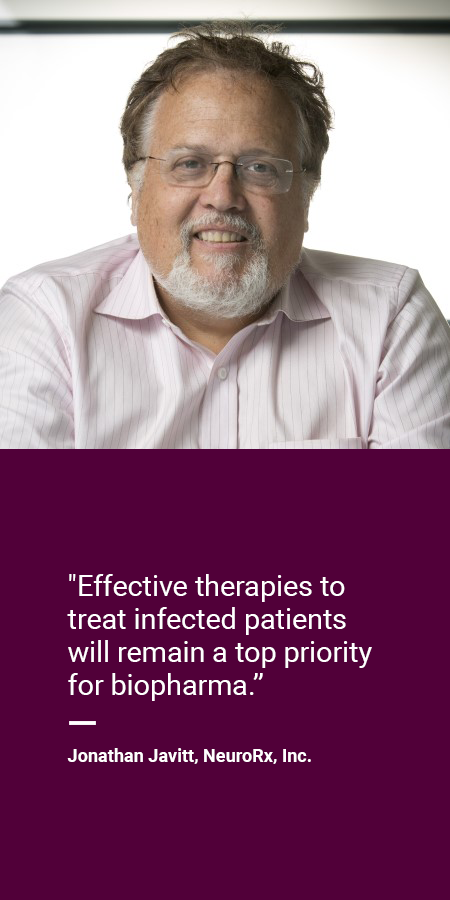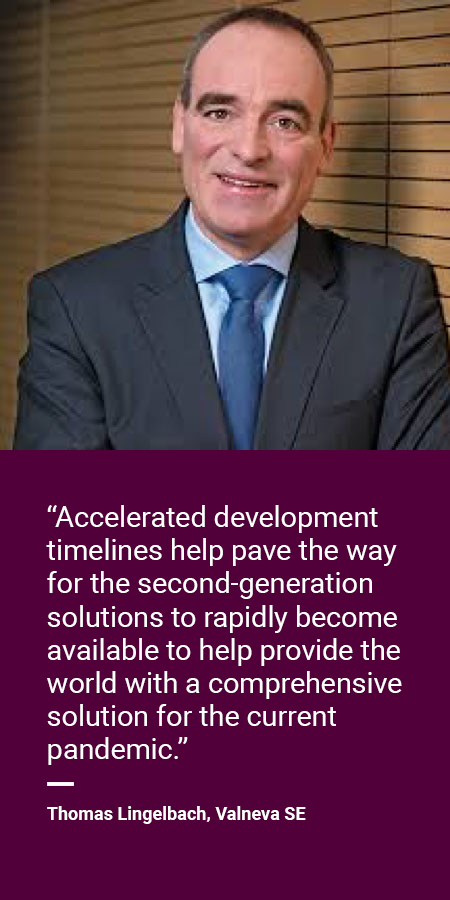Scrip Asks…What Does 2021 Hold For Biopharma? Part 1: Tackling COVID-19
Biopharma Provides Light At End Of Tunnel
Executive Summary
Industry leaders share their expectations around COVID-19 for the coming year. Further product development and vaccine rollout will be key themes in 2021. Equitable supply and addressing the mental health challenges associated with lockdowns also loom large.
SCRIP ASKS... What Does 2021 Hold For Biopharma?
A broad survey of the industry's expectations for the year to come.
Every December, Scrip asks industry leaders and experts to share their expectations for the year to come. With responses from more than 200 professionals, Scrip Asks… What Does 2021 Hold For Biopharma? provides an unprecedented insight into the biopharma universe's collective crystal ball. With the hopes of global humanity's recovery from the COVID-19 pandemic in 2021 resting so heavily on this sector, the series covers the following areas in consecutive installments:
- Tackling COVID-19
- COVID-19 Shock Waves And Silver Linings
- Patient Access To Health Care
- Technology And Disease
- Business Environment And Strategy
Biopharma leaders anticipate tackling COVID-19 will remain the top priority at least for the next few months. However, as Anne Heatherington, head of Takeda Pharmaceutical Co. Ltd.'s Data Sciences Institute, Research & Development, put it, the view is broadly that "in 2021, we'll see a way out of the pandemic led by pharma and biotech" and that this will lead to "increased visibility of the importance of what we all do for the health of society."
As Astrid Kurniawan, senior market access consultant, Informa Pharma Intelligence, pointed out, "COVID-19 has demonstrated that in times of a pandemic, the key to re-opening the economy and getting quickly back to normalcy is to accelerate the development of vaccines and therapeutics. Without this, the economy will continue to remain crippled."
Fortunately, in 2020 the industry stepped up to that challenge. "The life sciences industry played a critical role in navigating COVID-19, responding with extraordinary scientific achievement to an unprecedented crisis. In 2021, I believe biopharma will continue to drive innovation to curb the pandemic," said Jack Bailey, CEO of cancer-focused G1 Therapeutics Inc..
Click on the cards to read more predictions from industry executives.
Vaccines
"In 2021, we can expect the contributions of science to change the course of the pandemic by providing effective vaccines for people around the world with unprecedented speed," said Armin Szegedi, senior vice president and chief medical officer of Sunovion Pharmaceuticals Inc., which develops and markets therapies for respiratory, psychiatric and neurological disorders.
Joseph Kim, president and CEO of Inovio Pharmaceuticals, Inc., highlighted the need for a multipronged attack. "With roughly 8 billion people in the world, it's going to take several vaccines to fully address the impact of COVID-19. Initiatives that are able to provide a holistic perspective, facilitate information sharing and which keep us aligned in our shared commitment to addressing the global impact of COVID-19 will continue to be mission critical." Inovio is developing a DNA vaccine in Phase II for COVID-19, and is one of a number of companies in late-stage development behind the front-runners that have already started to receive authorization for use in a number of markets.
Franz-Werner Haas is CEO of CureVac BV, a German company working on an mRNA vaccine for COVID-19 that entered a Phase IIb/III trial in December 2020. "Based on our long-term scientific research and the positive data achieved to date from our clinical studies, we are expecting our mRNA technology to enter the market in 2021 and to considerably contribute to fighting the current pandemic," he told Scrip.
Andrei Floroiu, CEO of Vaxart, Inc., anticipates the coming year bringing further advances in the field of COVID-19 vaccines that will not only diversify but also improve on currently available products. "In 2021, we'll see improved COVID-19 vaccines, including transformational breakthroughs, such as a room-temperature stable oral tablet vaccine, making mass vaccinations practicable globally," he said.
Therapeutics
In the development of both treatments and preventive products for COVID-19, collaboration has been – and will continue to be – key. "The global fight against COVID-19 proved we must work together to meet society's most urgent health care needs," said Alexander Hardy, CEO of Genentech, Inc. (a Roche Holding AG group company). "We've experienced the power of public-private partnerships - as well as partnerships with sometimes unlikely allies - as the world raced to address the crisis. At Genentech, we're partnering with Gilead Sciences, Inc. to study a combination of our medicines in patients with severe COVID-19 pneumonia, and we've also joined forces with Regeneron Pharmaceuticals, Inc. and Atea Pharmaceuticals, Inc. to develop, manufacture and distribute their investigational antiviral medicines. 2021 will see the biopharma industry continue to come together - across the entire health care ecosystem - like never before, with a focus on COVID-19 and beyond." (Also see "Roche’s COVID-19 Collaboration Strategy Sees Promise In Combinations" - Scrip, 27 Nov, 2020.)
Ilya Yuffa, president of Eli Lilly Bio-Medicines, was on the same page. "At Lilly, we've seen incredible progress through multiple private and public collaborations to develop COVID-19 treatments at record pace … We're bringing the full force of our scientific and medical expertise to attack the coronavirus around the world by studying existing Lilly medicines to understand their potential in treating complications of COVID-19, and we're collaborating with partner companies to discover novel antibody treatments for COVID-19." (Also see "Lilly Gets Second EUA, For Baricitinib In COVID-19 Patients" - Scrip, 20 Nov, 2020.)
We got the same message from executives at smaller firms. Jonathan Javitt, CEO of NeuroRx, Inc., noted that: "In 2021 we will continue to work collaboratively in the industry to beat the pandemic. Given the speed at which vaccines are being administered, there will still be a great need for effective therapies to treat infected patients. This will remain a top priority for biopharma." (Also see "Relief Therapeutics/NeuroRx's Aviptadil Promise In COVID-19-Associated Respiratory Failure" - Scrip, 14 Oct, 2020.)
Cameron Durrant, chairman and CEO, Humanigen, Inc., underlined the importance of ensuring therapeutic development is not sidelined in the race to vaccinate the world. "The pandemic has revealed the inequities in our health care system and the vulnerabilities related to prioritizing preventive measures versus immediate therapeutics. These need equal attention to ensure both long-term and short-term solutions. Our focus is enabling treatment for the many thousands and perhaps hundreds of thousands of patients hospitalized with COVID-19 for whom a vaccine won't benefit, or aren't able to receive. While 2020 has been a year almost all of us would rather not have happened, we as a company with a late-stage promising COVID-19 therapeutic and broad clinical pipeline, are ready to take on what is likely to be a perpetual challenge for human health care in 2021 and beyond," he declared.
Dror Ben-Asher, CEO of RedHill Biopharma Ltd., was optimistic overall that new products will contain the virus within the next 12 months. "In 2021 I expect we will have found a way to live with COVID-19. This doesn't mean it goes away but it will be manageable and will stop being all consuming in terms of everyone's focus. The rollout of vaccines and the availability of effective therapeutic options will be key parts of this," he commented. "We expect our clinically advanced COVID-19 drug candidate, with its triple antiviral, anti-inflammatory and anti-thrombotic effect to generate Phase II/III study results early in 2021."
Complications Of COVID-19
Some of our respondents turned their attention from the efforts to tackle the virus itself to the need to deal with its complications, which can be grave. "For example, nearly 50% of hospitalized COVID-19 patients suffer renal complications, such as acute kidney injury, so biopharma must continue to meet the demand for innovation to ensure all patients have access to and receive the care they need," said Blaine McKee, president and CEO of Walden Biosciences, which specializes in developing medicines targeting the kidney.
Rachel Leheny, CEO of CalciMedica, Inc., also has an eye on tackling a serious COVID-19 complication. "At CalciMedica, we spent 2020 evaluating our small molecule CRAC channel inhibitor drug candidate, Auxora, in patients with severe COVID-19 pneumonia. Auxora has demonstrated safety and potential clinical efficacy in the acute care setting when we previously assessed it in patients with hypoxemia secondary to systemic inflammatory response syndrome in acute pancreatitis. As we look to 2021, we hope to be a key component of the care so crucially needed for patients with severe and critical COVID-19 pneumonia."
Mental Health Challenges
Aside from the disease burden of the infection and its complications, pharma has its part to play in other COVID-related health problems. "We must address the substantial mental health impacts caused by isolation during the pandemic," said NeuroRx, Inc.'s CEO Jonathan Javitt.
Armin Szegedi, senior vice president and chief medical officer of Sunovion Pharmaceuticals Inc., described it as "a double pandemic, with regard to COVID-19 and a rise in the attention on mental health." He called on industry to address this: "In the short term, we need to continue to provide the resources and support needed by people living with mental health conditions and their care partners. We also need to work as an industry to continue to bring forward new treatments for psychiatric and neuropsychiatric illnesses."
Peter Anastasiou, executive vice president and Head of North America at central nervous system (CNS)-focused H. Lundbeck A/S, agreed, noting that "amidst the many disruptions, there is opportunity for biopharma companies like Lundbeck to mobilize against the longer-term impacts of the pandemic, including the emerging mental health crisis and the repercussion of gaps in care."
"As we saw in 2020, the mental health impacts of the pandemic are profound. As the scale of this 'second-curve' crisis now comes into greater clarity, we expect a cross-sector response focused on early intervention and treatment. That's why Lundbeck has partnered with Mental Health America to create a national dashboard to help identify mental health hot spots. Informed by real-time data, decisionmakers can react quickly and deploy mental health support and resources where they are needed most. In 2021, we will continue to evolve this initiative and ensure that mental healthcare is provided in a timely manner to those who need it the most."
Supply
Ronald Piervincenzi, CEO of USP (US Pharmacopeia), the non-profit organization that develops standards to strengthen the global supply chain for medicines and supplements, predicted that: "The world's focus will justifiably be on the production and delivery of COVID-19 vaccines and therapies, dominating the biomanufacturing landscape, throughout 2021."
Developing products to treat and prevent a new disease in just a few short months is an amazing feat, but the challenge of getting them to patients around the world in high volumes is also tremendous. Mandar Paralkar, head of Life Sciences Industry at SAP, the enterprise application software specialist, believes: "Deep visibility across the global supply and demand chain will be crucial in the coming year. While other work will continue as always, the big story in biopharma will be the distribution of the COVID-19 vaccine. The world has been waiting breathlessly for the vaccine to be developed. Now that it is here, the industry will be judged on how effectively the vaccine gets to everywhere it needs to go".
"This means life sciences organizations will need to up their game to ensure they have full visibility into the global supply of and demand for the vaccine so they can meet the fair share manufacturing and distribution requirements set by government agencies around the world."
"This will include having technology that monitors the status of stock at their own manufacturing sites as well as contractors and raw material suppliers. When supplies in an area or region are reaching critically low levels, life science companies must ensure that technology can account for all the different business rules set by various authorities in different countries. All of this would be a complex challenge even without a life-threatening disease on the other side of that effort. Those who can manage it, however, will come out the other side a winner."
USP's Ronald Piervincenzi believes the industry will rise to the challenge: "Though not without challenges in supply chain and delivery, I am confident that billions can be vaccinated next year."
Access Inequities
Davinder Gill, ex-CEO of Hilleman Laboratories Pvt. Ltd., an equal joint-venture partnership between Merck & Co., Inc. and the Wellcome Trust, expected "a lesser focus on COVID-19 unless we are caught by a surprise through intractable variants of the virus. By now, we will have a few vaccines in hand which seem to be working well. Also, governments and healthcare communities have learnt difficult lesson on controlling the pandemic. The public at large has also become well informed and alerted to the dangers of the pandemic." However, he warned that even though "pharma business at large will remain global…The nationalistic wave will continue as far as vaccines are concerned."
With some nations already proving more successful than others in securing access to COVID-19 vaccines and treatments, debates and disputes over fair and rational distribution of vaccines are likely over the coming months. Access equity has local dimensions, too. With different territories defining their own priority lists for vaccine recipients as the rollouts begin, Robert Fallon, president, CEO and co-founder of cancer treatment developer Phosplatin Therapeutics, expected "equitable availability of COVID-19 vaccines" to "consume the media as vaccine deployment to the general population is expected to take 6-9 months."
What's Next?
"As the initial COVID-19 vaccines roll out to the general public, it's important to continue asking ourselves ‘what's next?' Although these advances are promising, we must maintain our momentum to establish an effective and efficient method for providing pain-free relief across the entire globe, while also staying one step ahead of the virus and its potential to mutate over time. In 2021, the industry's focus will shift to more widespread and equitable solutions to the pandemic, which lie in the next generation of vaccines and therapeutics that will enable the world to truly experience normalcy again," predicted Hans Keirstead, chairman and CEO of AIVITA Biomedical, Inc. , an immuno-oncology company that has applied its technology also to COVID-19, for which it has a personalized vaccine in a Phase II/III study.
"Throughout 2021, we'll continue to see companies advancing new vaccines and treatments for COVID-19 but the accelerated clinical development timelines that were for the most part pioneered in 2020 will be validated by the early success stories," forecast Thomas Lingelbach, CEO of Valneva SE, which is developing a COVID-19 vaccine that it hopes to launch later this year. "Hopefully, this helps pave the way for the second-generation solutions to rapidly become available to help provide the world with a comprehensive solution for the current pandemic."
Lumen Bioscience, Inc. CEO Brian Finrow also spotlighted "second-generation" approaches to COVID-19: "The distribution and adoption of COVID-19 vaccines will take time to bend the curve. This may create opportunities for second-wave innovators, particularly with technologies that could address major drawbacks of the first-round winners, including slow, expensive manufacturing, cumbersome administration and cold storage demands. Government funding will continue to lead the way in COVID research, and private capital will follow." Lumen specializes in technology to make biological drug manufacturing faster and cheaper.
For Kang-Xing (KX) Jin, head of health at Facebook, the dissemination of good information will contribute to better health outcomes. "COVID-19 has sped up and deepened collaboration between health organizations, technology companies and governments. This is good thing. Technology companies leverage our reach to connect a lot of people with expert information, fast. When we do this alongside health experts, we set the stage for better real-world health outcomes. People know more about how to keep themselves and their communities healthy," he told Scrip. "In 2021 the technology health industry should focus on getting people the latest, most reliable information about the COVID-19 vaccine."
Jennifer Buell, president and chief operating officer of immunotherapy specialist Agenus Inc., is optimistic about biopharma's ability to continue to tackle COVID-19 and in turn to enjoy a vibrant operating environment. "2021 has the potential to be a record-breaking year for biopharma. The imperative of the pandemic has driven wide application of AI [artificial intelligence] and machine learning in drug development leading to path-breaking timelines to approval. Biopharma's ongoing response to the pandemic will be dominant in 2021 – this will include new technologies, deal-making, and financings," she predicted.
Additional reporting by Joseph Haas.










